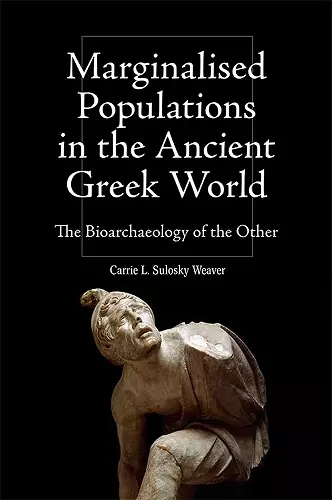Marginalised Populations in the Ancient Greek World
The Bioarchaeology of the Other
Carrie L Sulosky Weaver author
Format:Hardback
Publisher:Edinburgh University Press
Published:25th Mar '22
Currently unavailable, and unfortunately no date known when it will be back

Studies of the ancient Greek world have typically focused on the life histories of elite males as the group that has made the most distinct mark on ancient Greek literature, art and material culture. As a result, the voices of foreigners, the physically impaired, the impoverished and the generally disenfranchised have been silent, which has substantially complicated the creation of a historical narrative of these marginalised groups. To address this lacuna, previous research has turned to the limited evidence found in literature and material culture to reconstruct societal attitudes toward disenfranchised peoples. This book departs from that approach by primarily considering the skeletal remains and burial contexts of the individuals themselves. Drawing upon literary, artistic, material and biological evidence, it sheds new light on groups of individuals who were typically relegated to the periphery of Greek society in the Late Archaic and Classical periods. Offering the first comprehensive treatment of the biological evidence for marginality in the ancient Greek world, this book argues that intersectionality was the driving factor behind social marginalisation in the Late Archaic and Classical Greek world.
The book does an excellent job in terms of its primary aim: to familiarize in a comprehensible way non-specialist readers with the nature of osteo-archaeological evidence and the techniques employed by specialists, the interpretations that can be deduced from the evidence and the methodological pitfalls, and the existing osteo-archaeological corpora that have been analysed so far. The author makes evident how much ancient historians can learn from this body of evidence; at the same time, it also illustrates the extent to which interpretations will need to develop further: how exactly should we interpret the surprising evidence that skeletons from the Laurion mines seem to share the same diet with those of Athens? Clearly, there is much to be learnt, and co-operation between historians and bioarchaeologists will enhance the value of the evidence. -- Kostas Vlassopoulos, University of Crete * Greece & Rome *
Sulosky Weaver presents a compelling and lively interpretation of the marginalized people in ancient Greece—their young, old, sick, rich, poor, and infirm—based on her extraordinary context-based investigation of their skeletal remains. The book is a must read for anyone interested in this remarkable setting and its people. * Clark Spencer Larsen, Distinguished Professor of Anthropology, Ohio State University *
ISBN: 9781474415255
Dimensions: unknown
Weight: unknown
312 pages